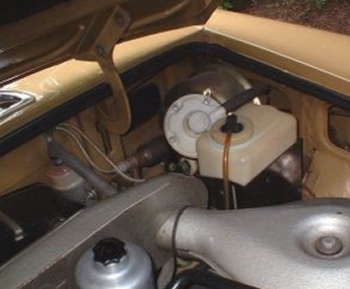


|
This is a cautionary note MGBV8 enthusiasts should take seriously - there have been 14 reports of a near instant loss of braking from from V8 members who have had that spine chilling experience with their MGBGTV8. When the servo fails and swallows the brake fluid it leaves you with a foot flat on the floor and no brakes. It's a truly alarming experience as those 14 members will tell you. If your servo has not been changed or at least checked since the car left the production line at the Abingdon plant, then we would urge you to have a 40 year old brake servo examined off the car and where necessary have it professionally refurbished. An alternative is to invest in a new servo because the reliability of your V8 brakes is not something to scrimp on – that cost is modest in terms of your peace of mind and safety! How a servo works. More Posted: 140504 | Fortunately brake failures from servo problems are rare but, unlike difficulties with slave cylinders where early warning signs can usually be detected, early warning signs of potential servo failure are few. A series of brake servo failures on MGBGTV8s have been reported by V8 members but fortunately at low speeds and without damage to the car or personal injury. If you have had the experience, thoughts of the consequences of a sudden servo failure and a complete loss of brakes at speed are spine chilling! Cautionary workshop note on brake servo failure A cautionary V8 Workshop Note was released in June 2001 following three servo failures reported by Victor Smith, Jim Gibson and Peter Berry. Since then we have had a further 11 reports of a brake servo failure. V8NOTE228 examined the first three cases and Roger Parker provided very useful views on the causes. He noted "the very big issue here is not the failure, which is something to expect over longer periods (but still a serious shock when it occurs), but two specific points. Service schedule - routine replacements Firstly the service schedule states that all brake hoses and seals should be replaced routinely every 36,000 miles or 36 months. This is a recognition that these parts degrade and so the routine replacement is a point that has to be stressed as an essential safety service item. Servo seal failure - no warning The other point to mention is that with a servo seal failure you do not get the same warning of an impending problem as you do with a master or wheel cylinder failing - the tell-tale wetness that you get running down the pedal or the dampness on the drum inside the tyre. Often you also get an indication of a problem |  through a reduction in or a clear change in brake efficiency." The note ended with the advice - whatever you do, don't scrimp on brake and servo maintenance. A replacement servo costs around £170 or alternatively have a good unit refurbished with new seals. A small price to pay for reliable brakes!" Glycol and silicone brake fluids topic The use of slicone fluid as an alternative to glycol came up as part of the servo failure topic. Silicone brake fluid Low brake fluid sensor Bob Owen developed a useful device to detect low brake fluid levels. See V8NOTE332 on the TE low brake fluid sensor and the detailed installation note V8NOTE332. More |
|
V8
Register - MG Car Club --- the leading group for MGV9 enthusiasts | ||